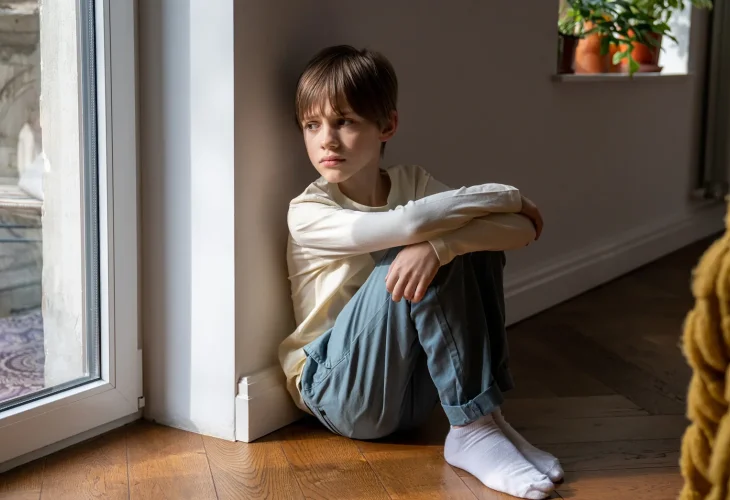Coping with Invisible Wounds: A Growing Mental Health Crisis
Every day, Irit Aloni receives dozens of calls at NATAL’s clinical department: "For 11 months, the tension hasn't decreased. We've grown from 300 to 3,000 patients, and it's just beginning."
 (Photo Illustration: Shutterstock)
(Photo Illustration: Shutterstock)"A father called us and said he's been sleeping with his children in the safe room for two months, anticipating an attack from Iran," begins Irit Aloni, a clinical social worker and psychotherapist specializing in trauma care, who manages the clinical unit at NATAL. "Another mother shared her struggles in caring for her children due to anxiety from watching too many videos and news."
Irit receives dozens of calls daily through the organization's helpline: "We provide mental health support for trauma victims affected by national concerns," she explains. "Before October 7, we were a small facility helping around 300 patients. Today, we have 3,000, and it seems like this is just the beginning. We've already received 54,000 calls to our helplines. It's not just about numbers; the intensity of the stories we hear is overwhelming. Parents who've lost children, families of hostages, soldiers with tragic stories, and many more. A stone was thrown into the lake of our existence, creeping into the personal cracks within each of us. This has created ripples of sorrow, fragmentation, stress, and anxiety in the soul, leading to a loss of trust that resonates across Israeli society."
 Irit Aloni (Photo: Ran Yitzhakel)
Irit Aloni (Photo: Ran Yitzhakel)"Invisible Wounds"
Under Irit's leadership, about 420 mental health professionals are working. "When the organization was founded 26 years ago, trauma victims were called 'invisible wounds.' We were a small boutique service providing for 200 soldiers and 80 terror victims. Then came October 7, with thousands of calls flooding in. I personally answered a whispering call from a woman trapped in a safe room with terrorists at the door. For 11 months now, the tension hasn't decreased despite the time that has passed. We are in a continuous trauma state that doesn’t let go."
Why hasn’t the tension decreased yet?
"The situation on the northern border is uncertain, and there's also fear of an Iranian attack. Other regions across the country are tense, and even Eilat is threatened by the Houthis. Most past wars we knew in Israel were shorter, and the tension stopped once they ended. We're not there; the potential threat, which we don't know when it will happen, keeps the body's systems in a constant state of unrest. It affects the home, marriage, children, and inner peace. It's not only about people living on the front lines but broader circles. Someone called the helpline this week saying 'I'm holding on so tightly, holding and holding, but I can no longer withstand this tension.'"
To the tension, there's also a sense of gloom. "People call us and say they cannot find joy while there are still hostages in Gaza. Each soldier's fall only raises the level of pain," continues Irit. "Additionally, unresolved old traumas resurface now—things we went through in childhood, memories from previous wars. These create more tension and bring additional challenges."
There are many circles of distress. "Reservists have left behind spouses and children who must cope alone, as well as parents and siblings who walk in fear and concern for the soldier's safety. When it's a hostage or the deceased, it affects the extended family and wider circles of neighbors, friends, etc. People in higher-risk areas are experiencing daily tension."
Many struggle to give legitimacy to their difficult feelings. "People call and ask for help but say 'give it first to those who deserve it more.' On one hand, this consideration for others warms the heart, but on the other, those in less severe circumstances often feel their pain isn’t legitimate, feeling guilty for their fear or depression. After all, others face greater threats or have already lost someone close to them, so who are they to feel such emotions?"
"No One Understands Me"
What response do you offer to the tide of emotions people are experiencing?
"We first provide legitimacy—acknowledge every feeling and give it space. The therapeutic connection, where a person shares their emotional distress with someone else, reduces all symptoms. Those who seek help early, before glaring red flags appear, benefit even more. Someone who has the courage to admit to themselves that they're struggling and reaches out for help has achieved something significant. The state also recognizes mental health struggles and provides comprehensive support, whether through social security or the defense ministry. Any small trigger allows access to free treatment. That father sleeping with his children in the safe room will surely receive free therapy. Anyone living close to conflict zones, evacuated from their home, a combatant or supporter of combat, experiencing terrorist events closely—just needs to reach out. We start with a series of 12 treatments, and if more is needed, up to 36 free sessions are possible."
This is a reminder that incredible resilience exists within the country’s citizens. "Most of the population is strong, discovering inner strengths we never knew. We know how to grow from trauma and continue to emphasize hope for the better. However, there’s absolute legitimacy for anyone who feels otherwise. In the abnormal state we’re in, these feelings are completely normal. It's okay to be stressed and anxious, to be worried about survival, and reassuringly, we can grow from them."
Seeking help isn’t easy; not everyone dares to take the step.
"True, there's often shame, a feeling of 'how did I get here?' Alongside that, there's the difficulty of touching pain, opening up, and processing tough experiences. So it's important to remember there's a healing process within therapy. We see it daily as we wrap individuals who’ve experienced crises. Helping them understand what happened, what they went through. People come not just with loss and grief, but with feelings of shame and guilt, and expressions of 'I survived, and they didn't.' Simply talking with a therapist and acknowledging the feelings brings immense relief. Once delving deeper into the pain, it allows for its release and empowerment of healthy internal strengths."
What symptoms suggest it's time to seek treatment?
"Those avoiding leaving the house to prevent street triggers reminding them of past events. Anxiety, anger, outbursts of crying, feelings of 'no one understands me,' 'no one knows what I endured.' These indicate that something is no longer smooth. In a trauma state, many resources collapse, affecting relationships, work, family, and friends. Therapy isn’t just about listening to suffering; it also helps return to functioning. Again, I emphasize—seeking help sooner is best to avoid post-trauma states or worsening symptoms."
In a broader context, Irit adds, "Today, everyone needs to put on glasses and be attentive to others’ pain. Recognize symptoms and direct people to counseling, or even just a short, anonymous conversation on the hotline. We're talking about around 17% of the population reaching out for help. And this is just the beginning for us because when it's all over, and people have time to process the experience, we assume they will reach out much more."
Not always easy to legitimize others' struggles.
"A woman recently told me about a family member of hers, living in relatively quiet northern areas, who sometimes sleeps with his kids in the safe room. She said she ridiculled him for being a coward unable to cope. I told her what’s really needed is to call him daily and ask how he’s doing. It is our responsibility as individuals and society to legitimize each person’s feelings and explain that it’s the most normal thing in the world."
Lowering the Stress
You mentioned that stress levels haven’t lowered in 11 months. Is there any way to reduce it?
"Yes, definitely. First, reduce media consumption, don’t listen to commentators telling us how dreadful the situation is. It seeps into the soul and affects children too. Some children regress due to the situation. They're playing less with friends or coming to sleep in parents’ beds, a result of our parental reactions. Moreover, it's important to engage in routine acts—playing with the children, going for a walk, maintaining family togetherness. Create safety anchors—a good meal, a shower, a conversation, music, sports, cooking—anything that makes us feel good. Mothers tell me they started baking challah every Friday with the kids; something about the dough and kneading makes them feel good. And when fear takes over and controls us, then seek help. Today there are so many therapeutic options—water therapy, equine therapy, art, writing, pet therapy, and more. If you feel you lack motivation to work, everything at home angers and agitates you, or you experience unexplained stomachaches, and these problems don’t resolve on their own, it’s time to visit."
Irit explains that treatment doesn’t have to be long. "Some don’t even come but use several anonymous phone conversations. There are those who need just a few sessions and it’s enough. Learning to articulate the pain and finding resources and strengths to cope is significant. Whenever someone feels the need to process what they’ve endured, it’s worthwhile. I've seen many reservists come to talk out of fear of developing PTSD, and they're definitely making the right choice. Therapy provides great strength and is aimed at growth from the crisis."
Is there any support for the religious community?
"Yes. There are religious therapists working with men and women separately. Additionally, there are non-clinical supports available. People can join group therapies, journeys, and more. It’s important to note that many support centers exist nationwide, some through organizations, others through health funds. Again, the government funds provide extensive assistance, recognizing it as a national need."
Finally, is there a link between feelings of hate and division within the nation to the accumulated tension?
"Sometimes, when there's fear and existential threat, we look for blame as we lack answers to how the great catastrophe happened. But this leads nowhere, especially not now, and rather deepens the existing lack of trust within the nation, and harms the body. Working through anger and feelings of guilt lowers tensions. Once responsibility is learned—through each person doing the best they can in their environment and seeing how they can help others, a large change can happen."
For mental health support for war and terror trauma victims, call NATAL's helpline at *3362.

